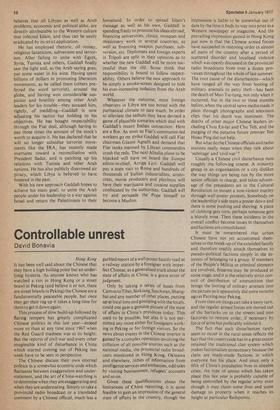Controllable unrest
David Bonavia
Hong Kong It has been well said about the Chinese that they have a high boiling point but an underlying hysteria. As anyone knows who has watched a riot in Hong Kong or a street brawl in Peking (and believe it or not, there are street brawls in Peking) the Chinese are a fundamentally peaceable people, but once they get their rag up it takes a long time for them to get it down again.
This process of slow build-up followed by flaring tempers has greatly complicated Chinese politics in this last year—indeed more so than at any time since 1967 when the Red Guard madness was at its height. But the reports of civil war and every other imaginable kind of disturbance in China which started coming out of Peking last week have to be seen in perspective.
The Chinese discuss their own internal politics in a somewhat eccentric code which fluctuates between exaggeration and understatement, and the art of China-watching is to determine when they are exaggerating and when they are understating. Simply to take a provincial radio broadcast or a translated comment by a Chinese official, much less a garbled report of a wall poster hastily read at a railway station by a foreigner with imperfect Chinese, as a generalised truth about the state of affairs in China, is a grave error of judgment.
Only by taking a series of buses from Canton toTi bet, Sinkiang, Szechwan ,Shanghai and any number of other places, putting up at local inns and gossiping with the locals, could one gain a genuine picture of the state of affairs in China's provinces today. This used to be possible, but alas it is not permitted any more either for foreigners working in Peking or for foreign visitors. So the news about events in the Chinese interior is gained by a complex operation involving the collation of all possible sources such as the national media, the provincial radio broadcasts monitored in Hong Kong, Okinawa and elsewhere, titbits of information from intelligence services and embassies, odd tales by visiting businessmen, refugees' accounts and so on.
Given these qualifications about the limitations of China reporting, it is quite feasible to gain an impression of the general state of affairs in the country, though the impression is liable to be somewhat out of date by the time it finds its way into print in a Western newspaper or magazine. And the prevailing impression gained in Hong Kong just now is that the Chinese armed forces have succeeded in restoring order in almost all parts of the country after a period of scattered disorder and localised violence which was openly discussed in the provincial radio broadcasts from over a dozen provinces throughout the whole of last summer. The root cause of the disturbances—which have ranged all the way from looting of military arsenals to petty theft—has been the death of Mao Tse-tung, not only when it occurred, but in the two or three months before, when the central news media made it plain through photographs and television clips that his death was imminent. The deaths of other major Chinese leaders including Chou En-lai and Chu Teh, and the purging of the putative future premier Ten Hsiao Ping did not help.
But what do theChineseofficials and radio stations really mean when they talk about 'sabotage' and 'civil war'?
Usually a Chinese civil disturbance runs roughly the follow ing course. A minority group in an organisation or a city dislikes the way things are being run by the more senior officials in charge, and takes advantage of the precedents set in the Cultural Revolution to mount a non-violent mutiny through wall poster protests. Somebody on the leadership's side tears a poster down and there is some pushing and shoving. A piece of clothing gets torn, perhaps someone gets a bloody nose. Then these incidents in the overall conflict become issues in themselves and factions are consolidated.
It must be remembered that urban Chinese have not yet accustomed themselves to the break-up of the extended family and therefore readily attach themselves to pseudo-political factions simply in the interests of belonging to a group. If members of the People's Militia or criminal elements are involved, firearms may be produced at some stage, and it is the relatively strict control of distribution of ammunition that brings the looting of military arsenals into the picture as it apparently did some months ago at Paoting near Peking.
From then on things can take a nasty turn, and the regular armed forces are moved out of the barracks on to the streets and into factories to restore order, if necessary by force of arms but preferably without it.
The fact that such disturbances rarely seem to occur in the rural areas reflects the fact that the countryside has to a great extent retained the traditional clan system which makes factionalism unnecessary because the clans are ready-made factions in which everyone has his place. And since only a fifth of China's population lives in sizeable cities, the type of unrest which has taken place this last year is probably capable of being controlled by the regular army even though it may claim some lives and some damage to property when it reaches its height at particular flashpoints.


































 Previous page
Previous page